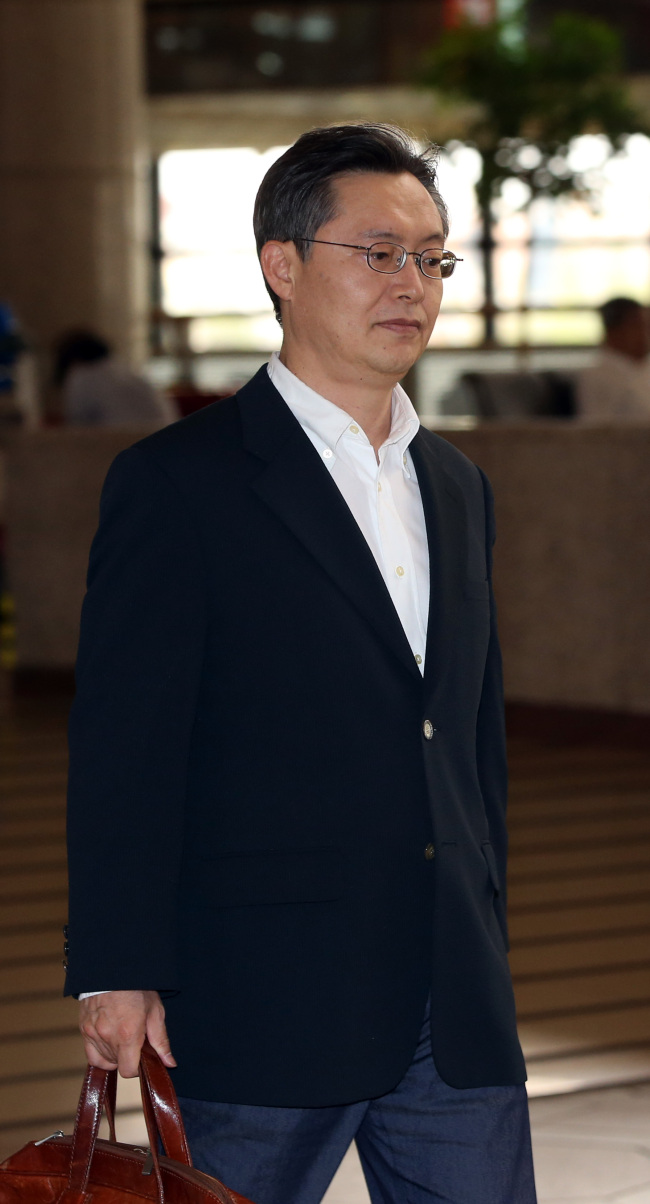Seoul’s nuclear envoy visits China to discuss N.K.
By Korea HeraldPublished : July 19, 2015 - 18:07
South Korea’s chief nuclear envoy Hwang Joon-kuk embarked on a six-day trip to China on Sunday, as part of the country’s push for North Korean denuclearization, which gained fresh attention after last Tuesday’s landmark deal on Iran’s nuclear program.

Hwang, Seoul’s Special Representative for Korean Peninsular Peace and Security Affairs, arrived in Shanghai for a three-day trip and is scheduled to leave for Beijing on Tuesday to meet opinion leaders from Chinese universities, think tanks and media, as well as top Chinese officials including Beijing’s top nuclear negotiator Wu Dawei. He returns on Friday.
His trip comes amid growing concerns over Pyongyang’s increasingly sophisticated nuclear capabilities and the lack of international efforts to press the reclusive regime to renounce its nuclear program.
The North, which has described itself as a nuclear power in its constitution, claims that it has already entered the technical phase of “miniaturizing and diversifying” nuclear bombs. Despite the North’s development of nuclear weapons technology, the multilateral negotiation process, involving the two Koreas, the U.S., China, Japan and Russia, remains dormant.
From Sunday through Tuesday, Hwang is to visit Fudan University, the Shanghai Academy of Social Sciences, Shanghai Institute for International Studies and the Oriental Morning Post, all of which are located in Shanghai.
From Tuesday through Friday, Hwang will be in Beijing to visit the China Institute of International Studies, the Central Party School of the Communist Party of China, the China Reform Forum and other institutions.
In China’s capital, Hwang will meet various scholars from Peking University and Tsinghua University. He will also hold talks with Chinese journalists from the Global Times, People’s Daily and Xinhua News Agency.
Hwang’s meeting with Wu Dawei will come on Thursday. At the meeting, the two are expected to exchange their views on how to strengthen bilateral cooperation to reopen dialogue with the North and stop it from further developing its nuclear weapons.
The North has so far refused to come out for talks with the international community, arguing that it would continue to strengthen its “nuclear deterrence” capabilities.
Initially, Seoul demanded that Pyongyang should first take “sincere” steps toward its denuclearization should it want the six-party talks to resume. But Seoul now demands that the North come out for unconditional “exploratory” talks before the six-party process resumes.
Attention is now focused on whether North Korean leader Kim Jong-un will attend the military parade, which will be held in Beijing on Sept. 3 to mark the 70th anniversary of China‘s victory in its “War of Resistance against Japanese Aggression.”
Some observers say that should Kim attend the event, this would be a rare opportunity for the international community including China to allow the secluded ruler to listen to global concerns about the North’s nuclear program.
By Song Sang-ho (sshluck@heraldcorp.com)
His trip comes amid growing concerns over Pyongyang’s increasingly sophisticated nuclear capabilities and the lack of international efforts to press the reclusive regime to renounce its nuclear program.
The North, which has described itself as a nuclear power in its constitution, claims that it has already entered the technical phase of “miniaturizing and diversifying” nuclear bombs. Despite the North’s development of nuclear weapons technology, the multilateral negotiation process, involving the two Koreas, the U.S., China, Japan and Russia, remains dormant.
From Sunday through Tuesday, Hwang is to visit Fudan University, the Shanghai Academy of Social Sciences, Shanghai Institute for International Studies and the Oriental Morning Post, all of which are located in Shanghai.
From Tuesday through Friday, Hwang will be in Beijing to visit the China Institute of International Studies, the Central Party School of the Communist Party of China, the China Reform Forum and other institutions.
In China’s capital, Hwang will meet various scholars from Peking University and Tsinghua University. He will also hold talks with Chinese journalists from the Global Times, People’s Daily and Xinhua News Agency.
Hwang’s meeting with Wu Dawei will come on Thursday. At the meeting, the two are expected to exchange their views on how to strengthen bilateral cooperation to reopen dialogue with the North and stop it from further developing its nuclear weapons.
The North has so far refused to come out for talks with the international community, arguing that it would continue to strengthen its “nuclear deterrence” capabilities.
Initially, Seoul demanded that Pyongyang should first take “sincere” steps toward its denuclearization should it want the six-party talks to resume. But Seoul now demands that the North come out for unconditional “exploratory” talks before the six-party process resumes.
Attention is now focused on whether North Korean leader Kim Jong-un will attend the military parade, which will be held in Beijing on Sept. 3 to mark the 70th anniversary of China‘s victory in its “War of Resistance against Japanese Aggression.”
Some observers say that should Kim attend the event, this would be a rare opportunity for the international community including China to allow the secluded ruler to listen to global concerns about the North’s nuclear program.
By Song Sang-ho (sshluck@heraldcorp.com)
-
Articles by Korea Herald








![[KH Explains] No more 'Michael' at Kakao Games](http://res.heraldm.com/phpwas/restmb_idxmake.php?idx=644&simg=/content/image/2024/04/28/20240428050183_0.jpg&u=20240428180321)

![[Weekender] How DDP emerged as an icon of Seoul](http://res.heraldm.com/phpwas/restmb_idxmake.php?idx=644&simg=/content/image/2024/04/25/20240425050915_0.jpg&u=)








![[Herald Interview] Mistakes turn into blessings in street performance, director says](http://res.heraldm.com/phpwas/restmb_idxmake.php?idx=652&simg=/content/image/2024/04/28/20240428050150_0.jpg&u=20240428174656)
